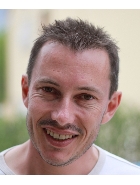|
Rationale
Maintaining
the dignity and autonomy of the elderly is at stake, therefore opening
research perspectives of interest for Inria Project Teams ( IPT). In
order to promote this theme and to coordinate the involved activity
researches amongst Inria institute, a Large Scale Initiative Action
gathers nine projects team from Nancy, Grenoble, Sophia Antipolis and
Rennes in one cross-entity named PAL (Personally Assisted Living)
On the 19th of
September 2011 a workshop will take place at Inria Sophia Antipolis
Méditerranée, to present this LSI Action and the researches pursued.
This meeting is aiming at sharing experiences and achievement with
people outside from Inria but all the same involved and interested in
this theme of Autonomy of the elderly and their maintaining at home.
This workshop will be part of the 8th Int. Conf.
on Computer Vision Systems ICVS hold on 20 - 22 September 2011. see ICVS
Research Centre INRIA Sophia
Antipolis - Méditerranée
2004, route des Lucioles - BP 93 - 06902 Sophia Antipolis Cedex, France
Contacts : david.daney@inria.fr,
nathalie.woodward@inria.fr
Workshop program
All the sessions will be held in the Jacques Morgenstern amphitheatre,
Gilles Kahn Building.
Monday,
September 19, 2011
| 08:30 - 09:00
Welcome |
09:00 - 09:30
Opening
Presentation of
the Large Scale Initiative Action Personally Assisted Living (PAL)
David Daney
|
09:30
- 10:30
|
Session
Actimetry:
Session Chair(s): Francois Bremond
|
From Smart Houses to Smart Care (30'):
Speaker: Bessam Abdulrazak (Universite de Sherbrooke)
|
Intelligent Tiles : Spatial Computing for Actimetry (30'):

Speaker:
Olivier Simonin (Maia)
|
10:30
- 11:00
|
Pause
(30') or Demo I (15 persons)
Francois Bremond
(Pulsar)
|
11:00
- 12:00
|
Session
SmartHome II:
Session Chair(s): James
Crowley
|
MemoryLane - Building digital life stories for memory support
(30'):

Speaker: Basel
Kikhia
|
Network interoperability and QoS for smart homes
(30'):

Speaker Ye
Qiong Song (Trio)
|
12:00
- 13:00
|
Session
Demo:
Coprin, Jean-Pierre Merlet (25
persons) (30')
Arobas, Patrick Rives (25
persons) (30')
|
13:00
- 13:45 Lunch + Demo
|
13:00
- 14:15 : Lunch at INRIA Research Center, Sophia Antipolis -
Méditerranée
13:45 - 14:15 : Demo II
(15 persons), Pulsar, Francois Bremond
|
14:15
- 15:15
|
Session
Context:
Session Chair(s): Monique Thonnat
|
The
EIT ICTLabs Thematic Action Line 'Health and Wellbeing' (30'):

Speaker: Jean
Gelissen (Philips, H&WB ICT Labs)
|
ICT for the elderly
(30'):

Speaker: Prof.
Phillipe Robert (UNSA, CHU Nice, France)
|
15:15
- 16:15
|
Session
Robotics for H & WB:
Session Chair(s): Francois
Chaumette
|
DOMEO, an open robotic platform for cognitive and physical personalized homecare services
(30'):

Speaker: Vincent Dupourque (Robosoft)
|
Mobility assistance
(30'):

Speaker: Anne
Spalanzani (E-motion)
|
16:15
- 16:45
|
Pause
(30') or Demo II (15 persons)
Francois Bremond
(Pulsar)
|
16:45
- 18:15
|
Session
Social interaction and Robotics:
Session Chair(s): Francois
Charpillet
|
Staying
at home in old age - Contribution of new technologies and
organisational concepts to maintain independence and quality of life
(30'):

Speaker: Barbara
Klein (University of Applied Sciences, Frankfurt, Germany)
|
Emotions
and human robot interaction (30'): 
Speaker: Christophe
Rousset (Robopec)
|
Perception for social interaction:

Speaker: James
Crowley (Prima)
|
Speakers
- Invited speakers
- Pal Members
- BREMOND Francois (demo), Pulsar
- DANEY David (speech), responsable de
l'Action d'Envergure PAL
- CROWLEY James (speech), Prima
- MERLET Jean-Pierre (demo),
Coprin
- RIVES Patrick (demo), Arobas
- SIMONIN Olivier (speech), Maia
- SONG Ye Qiong (speech), Trio
- SPALANZANI Anne (speech), E-motion
Abstracts
Jean Gelissen: The
EIT ICTLabs Thematic Action
Line 'Health and Wellbeing'

|
Jean
Gelissen
studied at
the Poly Technical School in Venlo, the Netherlands (graduated in
Electronics, specialization Computer Technology, in 1977) and did a
Post Graduate Course in Utrecht, The Netherlands (graduated in
Informatics, 1986). His training was extended with a large number of
technical and management courses from 1977 on during his professional
career at Philips (Research Laboratories).
His professional career started in 1977 at
Philips Research in Eindhoven, The Netherlands. He started in digital
signal processing, both in software and hardware development, and
gained large experience in computer networks, formal specification
methods, multimedia as well as multimedia processing architectures and
embedded software domain with a focus on architectures and methodology.
He has been Department Head of the IPA (Information Processing
Architectures) department (research group) in the Lifestyle program of
Philips Research and has been appointed to Senior Director of Strategic
Partnerships for the Lifestyle program that at Philips Research in 2006.
During his professional career Jean
Gelissen has had a significant number of contributions to international
conferences, journals and a number of books. He also has some 10+
patent applications on his name, some related to system architectures
however most related to multimedia formats and services. He also has
been involved in a large number of European project initiatives, as
member, initiator as well as project leader in the IST (initiated and
lead the OZONE and AMIGO projects) and ITEA (initiated and lead the
EUROPA, Robocop, Space4U, Trust4All and Metaverse1 projects) programs.
He has been involved in the ISO/IEC MPEG
standards body for some 12 years, also as the head of Dutch delegation,
and has contributed to MPEG-4, MPEG-21 and has initiated and completed
the MPEG-E 'Multimedia Middleware' standard ISO/IEC 23004. Recently he
has initiated a new ISO work item that has already resulted in the
first version of the MPEG-V 'Media context and control' standard
ISO/IEC 23005. Since the beginning of 2011 he has been appointed
(part-time) as the Action Line Leader of the thematic action line
Health and Wellbeing of the EIT ICTLabs.
|
Philippe Robert: ICT for the elderly
Abstract.
Normal aging, as well as the spectrum of neurodegenerative conditions
such as Alzheimer disease with its accompanying behavioural
disturbances, can significantly impact personal autonomy and quality of
life. This has major implications for our society as a whole. In this
context, the utilisation of and help from new technologies are being
developed. It is therefore extremely important to develop high-level
research into these new technologies, as well as information
technology, and to experiment with how they can be adapted to and
enhance the lives of the elderly.
Many efforts are currently undertaken to
investigate AD pathology and develop appropriate treatment strategies.
These strategies focus on preserving cognitive and functional abilities
along with reducing BPSD and maintaining quality of life in the AD
sufferer. Rating scales are essential tools for the diagnosis of AD,
the assessment and careful monitoring of symptoms, as well as the
evaluation of treatment effects. However these standard rating scales
do not fully capture the complexity of a disease. In fact, AD includes
deterioration in cognitive, behavioural and functional domains that do
not always progress in parallel and may change idiosyncratically
according to the individuality of a given patient. For this reason,
information and communication technology (ICT), in particular,
techniques involving imaging and video processing, could be of
interest. Such techniques enable the patients’ performances and actions
in real time and real life situations to be captured.

|
Philippe H Robert
completed his medical studies at the University of Nice Sophia
Antipolis in 1981, and received a PhD in Life Sciences in 1996 from the
University Pierre et Marie Curie, Paris. A native of Nice, he is
Professor of Psychiatry at the Nice School of Medicine, Director of the
Nice Memory Centre for Care and Research (CMRR), which is one of the 24
official French Memory Centres merging competency from gerontology,
neurology and psychiatry. He is also director of the Cognition,
Behaviour & Technology Unit (CoBTek) at the Nice Sophia Antipolis,
which aims to develop and transfer new technologies, developed for the
benefit of clinical medicine. Professor Robert teaches psychological
medicine and psychiatry, and psychogeriatrics for the geriatric
specialisation degree, and is also Director of the Masters programme in
psychobiology of behaviour.
Professor Robert’s clinical research goal is to improve directly the
understanding and treatment of patients who are referred to the Memory
Centre. His research activities focus on neuropsychiatric symptoms and
most particularly on apathy and on non-pharmacological treatment, He is
also the clinical partner of the IPMC Sophia-Antipolis group working on
biological markers and secretase.
Major scientific articles and book chapters that he has authored cover
topics including memory processes in schizophrenia; behavioural and
psychological symptoms of dementia (BPSD); the use of functional brain
imaging for the diagnosis of early Alzheimer’s disease (AD); and the
understanding and treatment of apathy in the elderly.
Within
the European Alzheimer Disease Consortium (EADC), Professor Robert
chairs the subgroup devoted to behavioural disturbances. . In France,
Professor Robert is an Executive Board member of the French Society of
Psychogeriatrics and in charge of the development of the national
electronic file for Memory consultation Commission in the French
Alzheimer’s disease 2008–2012 plan.
|
Vincent Dupourque: DOMEO, an open robotic platform for cognitive and physical personalized homecare services
Abstract.
The main objective of DOMEO, supported by the AAL joint programme of
the European Commission, is to provide evolutive robotic solutions to
help frail older people staying longer and safer at home, using
innovative Robotics and Information Technologies. Give more autonomy to
seniors who are unable to perform daily tasks for independent living,
and help caregivers in their everyday work are the 2 major ambitions of
DOMEO. The need will continue to grow as the oldest segment of the
population increases rapidly, and traditional family resources as well
as number of professional caregivers decrease.
DOMEO focuses on the development of an
open platform for the integration and the adaptation of personalised
services to provide end-to-end support, for medical care as well as
physical and cognitive assistance for secure independent living. This
platform includes 2 types of robots, and the necessary tools for
integration of various medical devices, sensors and services but also
customization of the robots functions. The middleware platform of DOMEO
is able to support the configuration of personalised innovative
interfaces for non-physical (verbal, visual and tactile) interactions,
and the integration of existing and forthcoming assistive technologies.
Barbara Klein: Staying at home in old age -
Contribution of new technologies and organisational concepts to maintain independence and quality of life.
Christophe Rousset: Emotions and human robot
interaction.

|
Christophe Rousset After a specialization in robotics, at the Ecole Centrale
Paris in 1995 he spent two years doing electronics
and embedded software development in
Houston at Schlumberger.
He joined ECA, a robotics firm, during 11 years.
First design engineer then project manager and
finally R&D manager, he worked on various
projects, with innovative and challenging technologies
: nuclear robotics, underwater fuelcell,
automated test bench for helicopter motorization,
warfare Robots (MiniRoc) for the DGA, AUV
(Autonomous Underwater Vehicle), ...
He took part in many collaborative research
programs in cooperation with research laboratories.
After this experience, he created Robopec in 2008,
a robotics company working on two businesses :
R&D engineering and conception, production and
commercialization of Reeti, a PCBot.
|
|